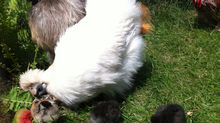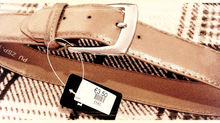Nutritious Homemade Chicken Feed
- Grumpy Chicken
- Jan 1, 2017
- 5 min read

For many chicken owners providing proper nutrition for their flock is something that, at least until you develop your own style and schedule, requires a good deal of thought and planning. Table scraps (*see list of exceptions*) are a great source of free nutrition as well as a fantastic way to reduce food waste.
If, like me, though you are not feeding a family of four fresh veggies on a day to day basis and prepare your veggies au naturale complete with their nutrient packed skins and stalks then kitchen scraps are few and far between. I decided instead to grow much of my chickens daily fresh food myself and then top that up with occasional visits to the local produce van in the nearby village. I learned early on never to pass by these friendly roadside produce vendors without taking a peek at whats on offer. Here in Abruzzo you wont get any fresher produce unless it is straight from your own garden to the table. Many of the land owners here take what they need from the soil to feed themselves and their families and then sell the rest off cheaply to give them some money towards the next years crop so in freshness and value its hard to beat!!
The local feed store/petshop will have several types of feed mix on offer too and sadly, along with cramped living conditions and over crowding, many of the mass production meat/egg farms will feed only this dry feed to their birds even though it is sorely lacking in many of the nutrients that chickens require to thrive and stay healthy.
That is not to say, however, that this dry feed should be avoided completely. In its way it can provide a good base for a balanced feed as long as it is supplemented correctly and the chickens love it. For my flock i have settled on a 1/3 dry mix to 2/3 fresh diet and i prepare it fresh each morning to make sure that all of the goodness goes straight to my birds without having time to leach away.
THE MAGIC RECIPE - Autumn/Winter
(I food process all fresh food to make it easier for the chickens to eat except for the lentils which they have far more fun with whole)

Butternut Squash x2 thick slices
Carrot x 4 large
Potato x2 small-medium (no green bits!!)
Apple x1 without core or seeds (apple seeds are poisonous)
Sprouted Lentils x1 tray
Wholegrain Bread x1 medium slice
Layers dry feed (high calcium content) x2-3 large cups
*I get around 4-5 cups worth of lentils and fresh ground down veggies after processing*
Add to the final mix a small handful of home grown meal worms and you will have some very healthy, happy chucks. *These ingredients modify depending on what veggies are in season*

Chickens require around 200g of healthy feed per bird per day (I give slightly more in the winter to help them stay warm in the form of a warm evening snack before they tuck down for the night) The easiest way I've found to avoid pulling the scales out every morning is to weigh it out the first time and then find a container that is the right size to hold it. From then on as long as the container is full you know you have prepared the right amount.

The above are simply my veggies of choice as they grow really well and are abundant in the autumn. Also they all store really well for very long periods of time if kept in the right conditions meaning that if i get snowed in (which happens most years at some point or another) then i still have plenty of stores to go at so the chicks don't go without.
COLD WEATHER SNACK

In the cold months providing a warm evening snack just before your birds roost can really go a long way towards helping them to stay nice and warm when the temperature drops at night. For my flock this means warm peas (but not boiled - as you lose the nutrients) cubes wholemeal bread and a drizzle of olive oil. To warm the peas (which I cheat with and buy frozen as I haven't had much success with them in the garden so far #snailfest!) i simply put them in to a colander and submerge in a sink of warm water while i prepare the bread. Then it's a simple case of combining the two and drizzling on the olive oil before dashing out to the coops before it goes cold et voila! happy warm chickens and a worry free night for me!! :}
OK so just to help you along in designing your own mix here are a few do's and dont's as far as what to give your flock....
(You will find a wealth of conflicting views on the items in these lists but these are my findings both from my own research and years of experience with my own birds and this list is not by any means exhaustive)
DO's
Squashes, pumpkins
Turnips + Turnip Greens
Melon, Watermelon
Cooked rice (brown or wild are best)
Leafy Greens (kale, lettuce, chard, collard, turnip tops)
Tomato
Carrots + Carrot Greens
Cucumber
Fruit & Berries (without seeds or pits to be safe) includes Cherries, Apples, Apricots, Peaches, Strawberries, Banana, Pomegranate (pomegranate seeds are safe)
Cabbage, Sprouts
Beetroot + Beetroot Greens
Sweet Potato
Potato (not green skinned ones as these are toxic)
Sunflower Seeds
Sprouted lentils
Sprouted Oats/Wheat (Fodder)
Bread - unbleached and preferably wholegrain or rustic style for max nutrients
Eggs (Boiled only shells and all - I know this seems a little icky but left to their own devices chickens will eat their own non fertile eggs to reabsorb some of the calcium back in to their bodies. Stay away from raw egg though as this can give them a taste for cannibalizing their own fresh eggs and leaving you non for your breakfast!!)
Beans (cooked or fully sprouted to the two leaves stage only as uncooked /unsprouted beans are toxic)
Yogurt & Cheese (both in small amounts can add a different flavour and a nice boost of calcium to your chickens diet)
Citrus (There is a big debate on whether or not to use citrus but i have been using it in small amounts for years by mixing a tsp with my animals water as the health benefits just cant be ignored. Citrus is only harmful in large quantities and at these excessive levels can result in thinning of the egg shells due to affecting the absorption of calcium but i have never had this issue with just adding it to their water and if you check out my article on lemon juice you will quickly see why its so fab.
*if you do notice thin shells at any point then stop providing citrus to make totally sure that this was actually the issue and not some underlying illness and if so then reduce the dose*
DON'Ts
Avocado (contains persin which is very toxic)
Chocolate/sweets/alcohol (goes without saying really!)
Green skinned potatoes (contain solanine which is toxic)
Dry beans (as mentioned above toxic unless fully sprouted to 2 leaves stage or boiled)
Moldy food (when i say kitchen scraps these are the waste bits that we choose not to eat and not rotten moldy stuff that we cant eat. Rule of thumb - if you wouldn't eat it then your chickens shouldn't either)
Pips and Pits from fruit (these often contain nasty stuff such as cyanide, as with cherry pits and apple seeds, and are very dangerous)
Salty/Sweet or Fried foods (its not good for us ergo its not good for them either)
Dry uncooked rice (can be potentially fatal to your flock)
Rhubarb (leaves or stems)
Again this list is not exhaustive so if you are planning on adding something new to your chucks diet then be sure to do a little of your own research first and if in doubt double check with a vet.












































Comments